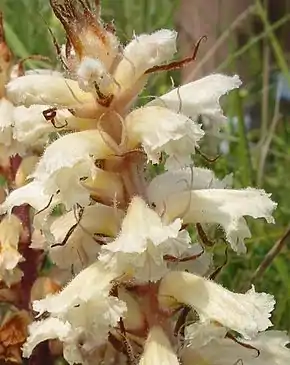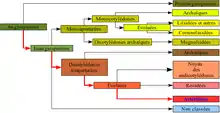Orobanchaceae
Les Orobanchacées (Orobanchaceae) sont une famille de plantes dicotylédones qui comprend notamment les orobanches qui parasitent de façon quasi spécifique d'autres plantes. Ce sont des plantes herbacées, à feuilles simples, alternes, plus ou moins parasites, des régions tempérées à subtropicales, surtout dans l'hémisphère nord.

| Règne | Plantae |
|---|---|
| Sous-règne | Tracheobionta |
| Division | Magnoliophyta |
| Classe | Magnoliopsida |
| Sous-classe | Asteridae |
| Ordre | Scrophulariales |

| Clade | Angiospermes |
|---|---|
| Clade | Dicotylédones vraies |
| Clade | Astéridées |
| Clade | Lamiidées |
| Ordre | Lamiales |
| Famille | Orobanchaceae |
_Negev.jpg.webp)
Étymologie
Le nom vient du genre type Orobanche, composé des mots grecs anciens οροβοσ / orobos, vesce, et αγχω / ancho, « serrer ; étrangler ; étouffer », en référence au caractère parasitaire de la plante. Pour Fournier il s'agit de « L'ancien nom grec d'une plante parasitaire des Vesces et des Lentilles ».
Classification
En classification classique, la famille des Orobanchacées comprend 180 espèces réparties en 60 à 70 genres.
Pour la classification phylogénétique APG (1998)[1] et la classification phylogénétique APG II (2003)[2] les contours de cette famille sont plus étendus avec près de 2 000 espèces réparties en 65 genres avec en particulier la tribu Rhinantheae comprenant les genres Euphrasia, Lathraea, Melampyrum et Pedicularis placés précédemment dans les Scrofulariacées. Cette famille est située dans l'ordre des Lamiales.
En classification phylogénétique APG IV (2016)[3], les Lindenbergiaceae et Rehmanniaceae sont inclus dans les Orobanchaceae.
Liste des tribus
Selon Angiosperm Phylogeny Website (7 Jul 2010)[4] et NCBI (7 Jul 2010)[5] :
- tribu Buchnereae
- tribu Orobancheae
- tribu Rhinantheae
Liste des genres
Selon Angiosperm Phylogeny Website (7 Jul 2010)[4] :
- Aeginetia
- Agalinis
- Asepalum
- Aureolaria
- Bartsia
- Boschniakia
- Buchnera
- Bungea
- Buttonia
- Castilleja
- Centranthera
- Christisonia
- Cistanche
- Clevelandia
- Conopholis
- Cordylanthus
- Cyclocheilon
- Cycnium
- Cymbaria
- Epifagus
- Escobedia
- Esterhazya
- Euphrasia
- Gentrya
- Gerardiina
- Gleadovia
- Graderia
- Harveya
- Hyobanche
- Kopsiopsis
- Lamourouxia
- Lathraea
- Leptorhabdos
- Macranthera
- Mannagettaea
- Melampyrum
- Melasma
- Micrargeria
- Monochasma
- Necranthus
- Nesogenes
- Nothochilus
- Odontites
- Omphalotrix
- Ophiocephalus
- Orobanche
- Orthocarpus
- Parentucellia
- Pedicularis
- Phacellanthus
- Phelypaea
- Phtheirospermum
- Physocalyx
- Platypholis
- Radamaea
- Rhamphicarpa
- Rhaphispermum
- Rhinanthus
- Schwalbea
- Seymeria
- Silviella
- Siphonostegia
- Sopubia
- Striga
- Tetraspidium
- Tienmuia
- Tozzia
- Xylanche
- Xylocalyx
- Asepalum
- tribu Buchnereae
- Cyclocheilon
- Nesogenes
- tribu Orobancheae
- Boschniakia
- Cistanche
- Conopholis
- Diphelypaea
- Epifagus
- Myzorrhiza
- Orobanche
- Phelipanche
- tribu Rhinantheae
- Aeginetia
- Bartsia
- Bungea
- Castilleja
- Clevelandia (botanique)
- Cordylanthus
- Cymbaria
- Euphrasia
- Hedbergia
- Lamourouxia
- Melampyrum
- Monochasma
- Nothobartsia
- Odontites
- Orthocarpus
- Parentucellia
- Pedicularis
- Phtheirospermum
- Pseudobartsia
- Pterygiella
- Rhinanthus
- Rhynchocorys
- Schwalbea
- Siphonostegia
- Tozzia
- Triphysaria
- Xizangia (botanique)
- Orobanchaceae incertae sedis
Selon DELTA Angio (7 Jul 2010)[6] :
- Aeginetia
- Boschniakia
- Christisonia
- Cistanche
- Conopholis
- Epifagus
- Gleadovia
- Kopsiopsis
- Lathraea
- Mannafettaea
- Necranthus
- Orobanche
- Phacellanthus
- Phelypaea
- Platypholis
- Scophulariaceae
- Xylanche
- Aeginetia L.
- Boschniakia C.A. Mey. ex Bong.
- Conopholis Wallr.
- Epifagus Nutt.
- Orobanche L.
Notes et références
- (en) Angiosperm Phylogeny Group, « An ordinal classification for the families of flowering plants », Annals of the Missouri Botanical Garden, Jardin botanique du Missouri, vol. 85, no 4, , p. 531–553 (ISSN 0026-6493, 2162-4372, 0893-3243 et 2326-487X, DOI 10.2307/2992015, JSTOR 2992015, lire en ligne)
- (en) Angiosperm Phylogeny Group, « An update of the Angiosperm Phylogeny Group classification for the orders and families of flowering plants: APG II », Botanical Journal of the Linnean Society, Wiley-Blackwell, Linnean Society of London et OUP, vol. 141, no 4, , p. 399–436 (ISSN 0024-4074 et 1095-8339, DOI 10.1046/J.1095-8339.2003.T01-1-00158.X)
- (en) Angiosperm Phylogeny Group, « An update of the Angiosperm Phylogeny Group classification for the orders and families of flowering plants: APG IV », Botanical Journal of the Linnean Society, Wiley-Blackwell, Linnean Society of London et OUP, vol. 181, no 1, , p. 1-20 (ISSN 0024-4074 et 1095-8339, DOI 10.1111/BOJ.12385)
- Stevens, P. F. (2001 onwards). Angiosperm Phylogeny Website. Version 14, July 2017 [and more or less continuously updated since]." will do. http://www.mobot.org/MOBOT/research/APweb/, consulté le 7 Jul 2010
- NCBI, consulté le 7 Jul 2010
- DELTA Angio, consulté le 7 Jul 2010
- Integrated Taxonomic Information System (ITIS), www.itis.gov, CC0 https://doi.org/10.5066/F7KH0KBK, consulté le 7 Jul 2010
Liens externes
- (fr) Référence Belles fleurs de France : Orobanchaceae
- (fr) Référence Belles fleurs de France 2 : Orobanchaceae
- (en) Référence Flora of China : Orobanchaceae
- (en) Référence Madagascar Catalogue : Orobanchaceae
- (en) Référence Flora of Chile : Orobanchaceae
- (en) Référence Angiosperm Phylogeny Website : Orobanchaceae ()
- (en) Référence DELTA Angio : Orobanchaceae Vent.
- Voir aussi Scrophulariaceae
- (en) Référence Catalogue of Life : Orobanchaceae Vent. (consulté le )
- (fr) Référence Tela Botanica (France métro) : Orobanchaceae
- (en) Référence BioLib : Orobanchaceae Vent.
- (en) Référence Paleobiology Database : Orobanchaceae Ventenat
- (fr+en) Référence ITIS : Orobanchaceae
- (en) Référence NCBI : Orobanchaceae (taxons inclus)
- (en) Référence GRIN : famille Orobanchaceae Vent. (+liste des genres contenant des synonymes)
- (fr+en) Référence CITES : famille Orobanchaceae (sur le site de l’UNEP-WCMC)
- (en) Référence FloraBase (Australie-Occidentale) : classification Orobanchaceae
- Portail de la botanique